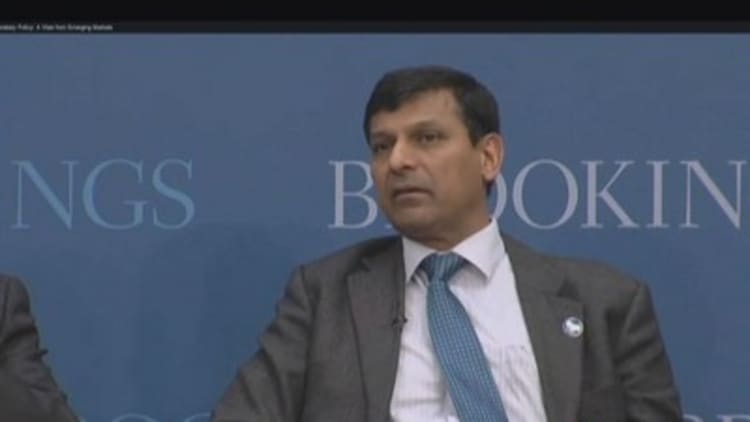
In a surprising faceoff Thursday between two of the world's most prominent central bankers, former Federal Reserve Chairman Ben Bernanke shot back at one of his most prominent critics in monetary policy circles: India's central bank chief, Raghuram Rajan.
Speaking at a Brookings Institution panel discussion in Washington, D.C., Rajan repeated his position that the world's most powerful central banks should pay more attention to how their policies affect other countries, calling for "better coordination."
He rhetorically asked, "If the policy hurts the rest of the world more than it helps the United States, should this policy be pursued?"
Adding fuel to the fire, he suggested the Fed has kept interest rates low for too long through its "quantitative easing" asset purchases.
Referring to QE, Rajan said unconventional policies "have a role," but "the benefits are much less clear once they are prolonged."
Many of the emerging markets, most prominently India, saw significant outflows of capital when it became clear in recent months that the Fed was going to slow the pace of those purchases.
The currencies of India, Brazil, Indonesia and others sold off dramatically as foreign investors no longer needed to hold them to invest in those countries.
Bernanke, formerly the head of the Fed, but the architect of the policies Rajan spent 20 minutes criticizing, was in the audience. He is now a distinguished fellow in residence at Brookings.
Bernanke was called on to ask the first question after Rajan's remarks, but delivered more of a criticism than a question.
"The speech just reflects the fact that you are very skeptical of unconventional monetary policies. You say that the rules of the game should prevent policies with 'large adverse spillovers and questionable domestic benefits.' If you have a different empirical assessment than I do, that in fact, emerging markets would be better off if they hadn't been used, then you would have a different view."
Bernanke also said he wanted to take Rajan "to task" for "ignoring money."
"You make a very clever equivalence between exchange rate intervention and unconventional monetary policy. There's one big difference, which is that exchange rate intervention sterilized the effects on monetary policy or on money supply. What that means is unconventional policies are demand augmenting, they increase demand in the economy, whereas exchange rate interventions like the tariffs of the 1930s are demand diverting."
Charles Evans, president of the Chicago Federal Reserve was also critical of Rajan's position. "We try to pay attention to the effect that those economies have on our economy and the effect we have on theirs, but at some point our mandate, our responsibilities, are for the U.S."
Afterward, Rajan and Bernanke were seen shaking hands, and Rajan told Bernanke, "Ben, I'm going to miss you."
—By CNBC's Michelle Caruso-Cabrera


